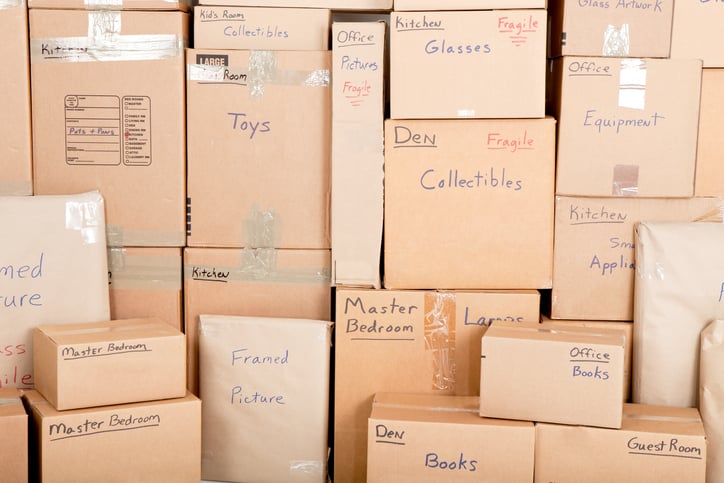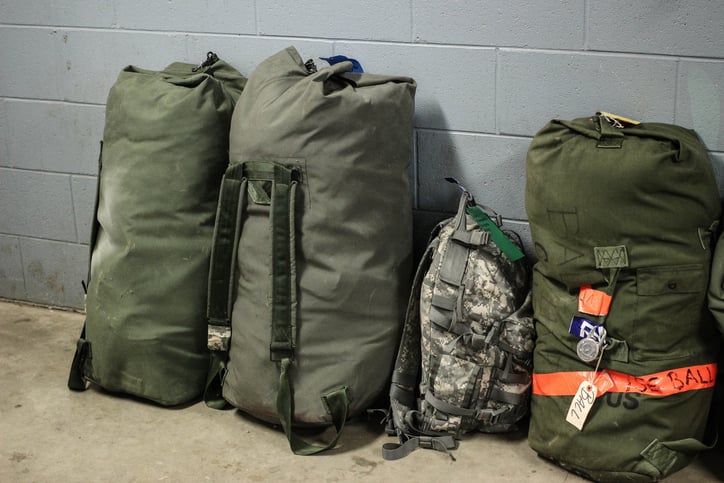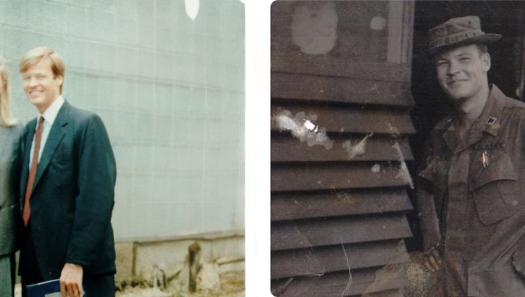Military & Veterans Life
The Ultimate Military Moving Guide for Your Next PCS

Moving is already hard for civilians, but moving in the military means dealing with plenty of red tape and paperwork, and navigating rules and regulations that can prove confusing. The good news is that there are many educational resources and counseling services available for you and your family, and you get to see more of your country or the world!
When you receive a Permanent Change of Station Order (PCS), it’s time to immediately jump to action! In this guide we will cover the general things you must do to prepare for your move, as well as who you'll need to contact, entitlements you likely qualify to help you plan for your move financially, and how to navigate the many moving options available to you. You can jump in no matter how short-notice your move might be and no matter how many family members (and furbabies) you are moving. You ready? Let's get started!
 1. Contact the Appropriate Agencies ASAP
1. Contact the Appropriate Agencies ASAP
Your move will go much more smoothly if you contact the following agencies for help as soon as you are notified that you will be relocating. No need to wait for the official orders to come through - you can and should start planning before you receive PCS Orders.
Here are a few of the most important agencies you will want to contact during your PCS move:
Defense Logistics Agency (DLA)
This is the agency you will need to contact to request your Permanent Change of Station Orders. You’ll need your orders to arrange your move and many other details of your PCS, so make sure to do this as soon as possible and keep checking in to get your orders as fast as you can. Contact DLA here.
Housing Office
As soon as you find out you are moving, immediately contact the housing office at your new base to get into the housing waiting list if you plan to live on-base. This will ensure that you get into a home as quickly as possible. If you plan to live off-base, they can also help by recommending good areas, and sometimes even have relationships with real estate agents and landlords to help you locate housing at an affordable price.
Military and Family Support Center
As soon as you are notified of your Permanent Change of Station, you should immediately contact your Military and Family Support Center and schedule an appointment with a relocation assistance specialist. Though this office goes by slightly different names depending on your branch of service, its staff can help you prepare for your PCS by giving you tips on budgeting, educating you on the different types of moves available, and resources on finding a job at your next duty station - all free of charge. They can also help you arrange childcare on moving days.
Travel Management Office
The Travel Management Office will deal with everything related to relocating your household and yourself, and also with setting up housing allowances. Though they probably can’t help you until you get your official paperwork, you’ll want to contact them as soon as your paperwork comes through to make sure your move is scheduled, especially during peak months in the summer when it may take longer to secure the services you need.
Generally, they will have you come into their offices for a meeting, enter you in their system, and then tell you when you can expect a call from a government-contracted carrier. If you don’t get a call from your carrier within 5-7 days, make sure to call the TMO back and make sure there wasn’t a mistake.
You can find and contact the Defense Travel Administrator for your site here. If you need help, you can call 1-888-Help1Go (888-435-7146) or submit a help desk ticket here.
Defense Military Pay Office
To arrange travel reimbursements, work with your local Defense Military Pay Office (DMPO). They will help you fill out all necessary forms and arrange your reimbursements. You should allow 4 weeks for reimbursements, though you may receive them much faster.
You can fill out your Travel Voucher (the form you fill out to claim your reimbursement) online or download and submit other PCS travel forms here.
You can check the status of your reimbursement here.
 2. Which Entitlements Do You Qualify For?
2. Which Entitlements Do You Qualify For?
When completing a PCS move, you are likely eligible for many entitlements designer to help offset the cost of your move. Make sure you educate yourself about your possible entitlements and talk with a counselor about how to secure as much assistance as possible as soon as you find out you are relocating.
Here's a rundown of some of the entitlements you may qualify for:
Advanced Travel Payment
You can apply for this before your Personally Procured Move to help offset upfront costs. Some service members choose to take this route when their move date is too close to allow for a government contracted mover to complete their move.
Dislocation Allowance
Before your move, you can apply for DLA to cover the costs of relocating your home. This entitlement covers things like transferring your utilities and home services, forwarding mail and packages, or other miscellaneous expenses tied to moving that are not covered by other reimbursements or allowances. The amount you’ll be paid varies depending on rank and how many dependents claimed by the service member.
Lodging
If you are traveling over 500 miles and will be making a multiple-day trip from your current base to your new base, you’ll be reimbursed for lodging expenses. The government only pays a certain amount, though, based on where you have stopped. Generally, it’s more than enough to pay for a room at a mid-range hotel. Always ask if your hotel offers a military discount or government rate, or simply use your VetRewards Card to get up to 40% OFF on your booking.
Monetary Allowance in Lieu of Transportation (MALT)
Basically, this is a mileage reimbursement. You can claim it for up to two cars, referred to as Privately Owned Conveyances (POC), if traveling with dependants. If you are driving your own vehicle to your new base, you will be reimbursed for the wear and tear your car accrues during your trip, as well as gas and tolls. You’ll be paid a fixed rate per mile.
Transportation of Privately Owned Conveyances (POC)
If you will be stationed overseas, you can ship one vehicle there and back with you, courtesy of the government. However, this entitlement must be included in your orders and you must deliver your vehicle to an approved shipping location and pick it up at an approved receiving location, which can be a major pain. You can request an alternate port by contacting the Personal Property Shipping Office (PPSO).
Per Diem (PLUS)
While you are traveling to your new base, you’ll be paid per diem for food and other miscellaneous daily expenses. The amount paid varies.
Temporary Lodging Expense (TLE)
When you arrive at your duty station, your on-base or off-base (depending on what is available) housing may not yet be available. The government will pay for up to 10 days of temporary lodging, which is intended to cover lodging and food, but you can’t use this on the same days you use per diem. Make sure you let your moving company know that you can’t yet accept delivery of your belongings. The moving company will store them for over a month for you, so don’t worry.
Basic Housing Allowance (BHA)
If you will not be living on-base when you arrive at your new base, you may be eligible to receive a Basic Housing Allowance (BHA), non-taxable funds to pay for rent. This may also include funds for paying utilities.
Temporary Lodging Allowance (TLA)
This is basically the same as a TLE, except that it is available for service members who have been transferred overseas. You have up to 60 days of TLA after you arrive at your new base overseas if you are waiting for housing. You can also use 10 days of TLA before you depart for your new base.
Overseas Housing Allowance (OHA)
If you will not be living in government quarters when you arrive overseas, you are eligible for a non-taxable Overseas Housing Allowance, paid on a monthly basis to cover rent. You may also receive a utility allowance in conjunction with your OHA.
Move-In Housing Allowance (MIHA)
If you have to live in privately-owned or rented housing when transferred overseas, the Move-in Housing Allowance covers miscellaneous one-time costs associated with your move. You have to be receiving OHA to be eligible for this entitlement, and you can use it to pay non-refundable deposits, purchase necessary appliances, install security, or make other improvements necessary for safe and comfortable living.
 3. Set a New Budget and Begin Saving
3. Set a New Budget and Begin Saving
It’s likely that your Basic Housing Allowance will change when you move, so it’s important to find out as soon as possible what your adjusted allowance will be. This will determine what type of housing you will be able to afford at your new location. You’ll also need to account for moving expenses - the military will reimburse you for most of your costs, but sometimes not all and not until several weeks after the move is complete. The more money you can save before you move, the better. There will be expenses you do not expect - you might want to take a vacation or make a road trip of your move!
If you’re struggling to plan your finances, don’t feel bad - take charge. We offer free financial planning services for all VetRewards Members. An unexpected or last-minute move can sometimes place you in an impossible financial situation, but there are plenty of organizations that help military and their families in emergencies. Contact your local Military and Family Support Center or check out our list of trusted non-profits to find help now.
 4. Choose Your Move
4. Choose Your Move
Will you opt for a Personally Procured Move, a partial PPM, or a Transportation Management Office (TMO) Full Move? There are benefits and drawbacks to each, and your decision will depend on your finances, the amount of time you have to plan your move, and how well you want your items packed, inventoried and labeled.
A Personally Procured Move (PPM), or Do It Yourself (DITY) move is when you choose to move all of your things yourself and have the military reimburse you. Some service members see this type of move as an opportunity to actually make money off of their PCS. While it can be done, you must be a thrifty person and a great planner to make this work. If you struggle with organization, have a short amount of time in which to complete your PCS, do not wish to drive cross-country, or are concerned about damaging valuable items, it might be best to steer clear of a PPM.
A Partial PPM allows you to pack and transport some of your belongings, while the military handles the scheduling of the move and contracts a company to transport your things. This can be a good option if you want to make sure your things are packed carefully, or if you want to take the opportunity to road trip and see a few sights on your way to your new duty station. It also allows you to pack open food containers, aerosols, and other items that you otherwise might have to toss because movers aren’t legally allowed to transport them.
A standard, TMO Full Move means that the military will handle every aspect of your move. All you have to do is inventory your items, supervise the movers, and sign some paperwork. This is sometimes the easiest option, but you will need to be thorough in your inventory in case of damage. It can be a totally painless process if you are blessed with a good moving company but can be hellish if you are stuck with an irresponsible company - enter at your own risk and make sure you document absolutely everything.
 5. Start Decluttering
5. Start Decluttering
One of the easiest ways to comply with your weight limit is to decrease the amount of “stuff” that you will be moving. Do you really need 3 dish racks? Do you have clothes in your closet that you haven’t worn in years? Is your child’s room full of toys that they have outgrown? If so, it’s time to have a yard sale or donate items to a local charity!
The sooner you can get started, the more options you will have for selling your unwanted items and recouping some costs. List anything that is in good condition online - services like OfferUp, Facebook Marketplace, Ebay, and Craigslist are great places to sell household items. Designer clothing can be resold using Poshmark or ThredUp, and children’s clothes can be resold online or at brick-and-mortar retailers like Kid-to-Kid and Once Upon a Child.
Also, consider items that you can easily replace at your new home. Do you really want to transport your toilet brush and mop across the country? Unless it has sentimental value, scrutinize how valuable something is to you and toss it if it’s old or dirty.
 6. Start Your Inventory
6. Start Your Inventory
Moving companies don’t always pack your things as carefully as you would yourself, so it’s best to prepare your items for the movers even if you plan on letting the military handle the fulfillment of your move.
You MUST do a thorough inventory of your belongings before they are packed, and should also make notes of which items are packed in each box. This ensures that if anything is lost or damaged, the military will have the documentation necessary to reimburse you.
Video and photos can make this process much faster and easier, and serve as a bulletproof record when asking the military to replace or reimburse you for lost or damaged items. Make sure you record serial numbers, make notes of any existing damage, and list all parts and accessories. Also, have any valuable pieces like antiques or collectibles appraised so you don’t get lowballed if they are damaged.
 7. Get Your Weight Limit and Set Aside “Pro Gear”
7. Get Your Weight Limit and Set Aside “Pro Gear”
You will have a weight restriction for your move based on the rank of the servicemember and how many dependents they claim. This means that the military will pay for that specific weight amount of household goods to be moved or shipped, but that you will be financially responsible for any overages. This can really put a dent in your budget if you are careless.
It’s important to note that servicemembers “Pro Gear” (Professional Books, Papers, and Equipment, or PBP&E) doesn’t count toward your weight limit. Pack these things separately. Pro Gear cannot include items owned by a child or spouse, and generally consists of specialized instruments of tools, equipment, and clothing, like helmets, fly and dive suits, and other items that are not standard-issue uniform. Every branch has different rules, so check with your Transportation Office about specific weight allowances and which items are and are not allowed.
 8. Prepare Your Children
8. Prepare Your Children
Moving can be especially hard for children. Change is scary, and they will have to leave their friends and school behind, their home, and relatives that they love. So what can you do to help your child accept that you will be moving and prepare them emotionally?
There will always be some sadness and anger when you tell your child that you are moving, but it’s also important to focus on the excitement of traveling to a new place, having a new room, making new friends, and getting to buy a few new toys!
Make sure that you tell your child you will be moving as soon as possible so they have time to absorb the information and spend plenty of time with their friends. Involve them in the decluttering process, packing, and planning your road trip or vacation, if you’ll be taking one.
 9. Plan for Moving Day
9. Plan for Moving Day
The day of your move will likely go by in a frenzied whir, so it's best to plan ahead so you don't have to make any big decisions on the big day. You'll likely have made a handy-dandy PCS Moving Binder to hold all of your important forms and documents, and you'll have backed it up digitally just in case! This means you'll have all of the information you need available at arms reach.
Pack a box of essentials for your new home. This includes things like curtains, bedsheets, clothing, toiletries, and anything else you know you will need within the first few days of your arrival. Your shipment could be delayed, so you want to prepare for a few days without your things.
You'll also want to designate one room of your home as the "safe zone" before your packers and movers arrive. This should be a room that you can lock. Here you will store any items that you do not want packed or moved - items that will be traveling with you, are essentials for your new home, things that you'll need if you have a few days left at your departing home, or anything valuable that you are afraid might get stolen. Place everything in your "safe room" and lock it up before the movers arrive.
If you are moving with children or pets, work with your Military and Family Support Center to arrange childcare or pet boarding on the day of your move. This will cut down on disturbances and make it easier for the movers to do their job.
10. Packing and Moving Day
Day
If you have chosen a TMO Full Move, you'll need to supervise the movers, making sure that you thoroughly inventory what goes into each box. Invite friends and family over to assist in this process, if possible - the more people you have helping the faster it will go! By this point, you should have a pretty detailed inventory of your possessions, but noting what is in each box will help you if a box goes missing or is damaged in transit.
Seasoned PCS'ers advise that it is a great idea to write an inventory sheet for each box and tape it to the box to make unpacking easier, also including a copy for your records that will stay with you. You can also write rooms on the boxes to make it easier for the movers to know where to place your boxes when they arrive at your new home.
Also, make sure to indicate boxes that are fragile. Your movers may not do this, and it's possible your belongings will get damaged upon arrival if they aren't properly labeled.
 11. Arriving Move
11. Arriving Move
When you arrive at your new home, you will need to schedule a date for your movers to deliver your things. You can leave your belongings in storage for up to 45 days if you need to repaint or do minor repairs. When they arrive, you are entitled to have them unpack and reassemble anything that was disassembled at your previous residence.
You may find that some of your things were damaged or lost in the move. This is when your detailed inventory will come in handy! The government will reimburse you Full Replacement Value (FVR) for any damaged goods, but you have to be able to give a very accurate estimate of the cost of the item and return the appropriate forms in a timely manner. It's best to note all damage or missing items when your belongings are delivered by the moving company, and thoroughly document using before and after photos.
The moving company is supposed to supply the form (DD 1840) and they must be signed by a representative from the carrier as well as yourself. If you need more time you can also submit a form DD1840R and report damages up to 75 days after delivery. DO NOT sign a DD 1840 form until you have inspected your items for damage. You will also need to submit DD from 1844 with a detail of the price of each of your damaged items within 9 months of your delivery to receive your reimbursement.
While a military move, or any move for that matter, can be daunting, if you educate yourself and follow the tips and action items available in this article, you will make it through this! We promise! To make things easier, our Exclusive Partners offer savings on moving trucks, vans and supplies, rental cars, hotels, and even vacation packages if you are planning to get away for a while during your PCS move. VetRewards members have access to loads of moving and travel-related discounts, so make sure you check out the Military Discounts Marketplace to get the best prices possible!


